
NASA seeks faster, more affordable Mars sample return to Earth
What's the story
NASA is actively seeking a more economical and swifter method to retrieve samples from Mars due to budgetary restrictions. The current plan, as revealed by NASA Administrator Bill Nelson in a recent teleconference, could cost up to $11 billion and may not be feasible until 2040. "That is unacceptable to wait that long," Nelson stated, emphasizing the significance of the mission to return Martian dust and rock samples.
Cost reduction
NASA targets lower budget, earlier sample return
The proposed 2025 budget for NASA, along with potential future budget cuts, are impeding the progress of the current Mars sample return plan. Nelson hinted that NASA is aiming for a budget below $7 billion and plans to retrieve the samples within the 2030s. To achieve this goal, NASA plans to solicit suggestions from its various centers and the Jet Propulsion Laboratory, for a more efficient and cost-effective return mission.
Doubts
Independent review questions Mars sample return viability
An independent review done in September 2023, raised several concerns about the feasibility of NASA's Mars Sample Return Mission. Initially, NASA had projected a launch in 2027 or 2028 for the same. However, due to "technical issues, risks, and performance-to-date," as per the independent review, this timeline was deemed unattainable.
Invitation
NASA invites proposals
NASA is now inviting industry participants to propose an alternative plan that would reduce costs and expedite the return of Martian samples. The space agency is seeking proposals for a simpler mission design that would hasten sample retrieval.
SpaceX proposal
SpaceX proposes alternative for Mars sample return
Elon Musk, founder of SpaceX, stated today that his company would be submitting a proposal in response to NASA's call for alternatives. Musk suggested that SpaceX's Starship rocket could potentially bring back "serious tonnage" within less than five years. However, it should be noted that Starship has faced its own series of delays and challenges.